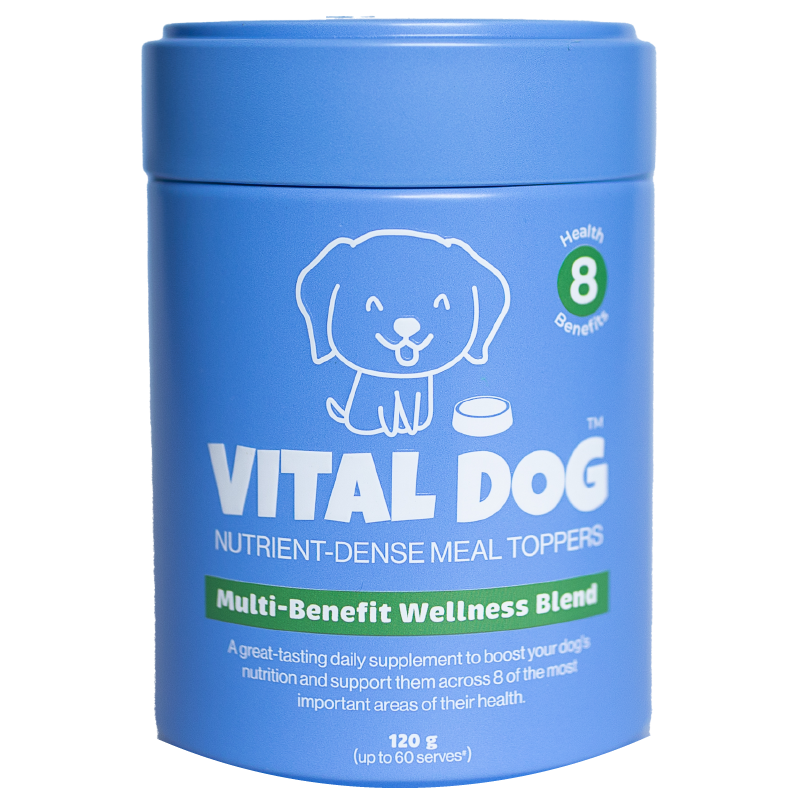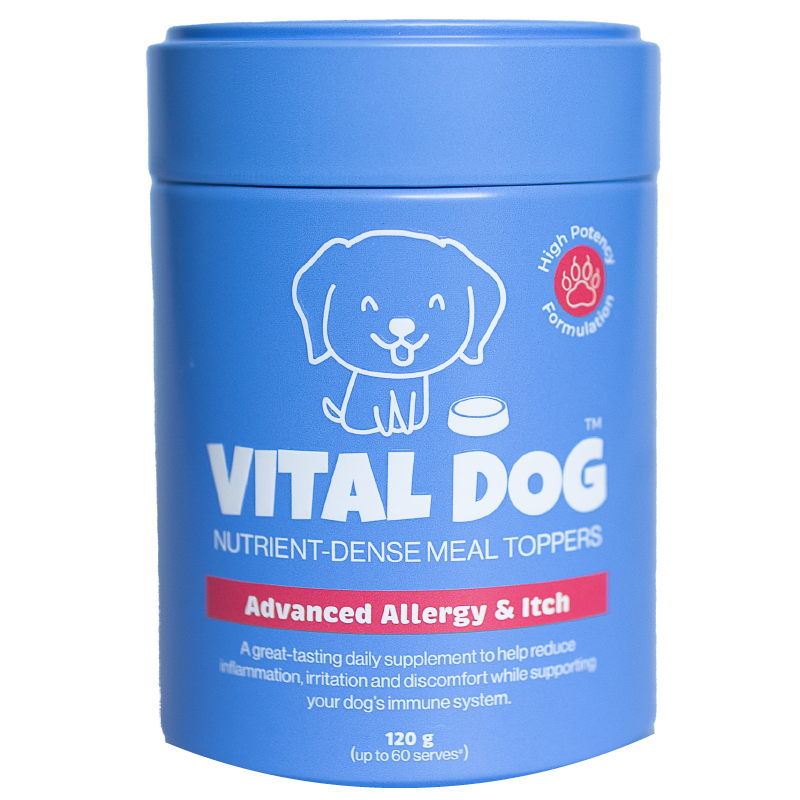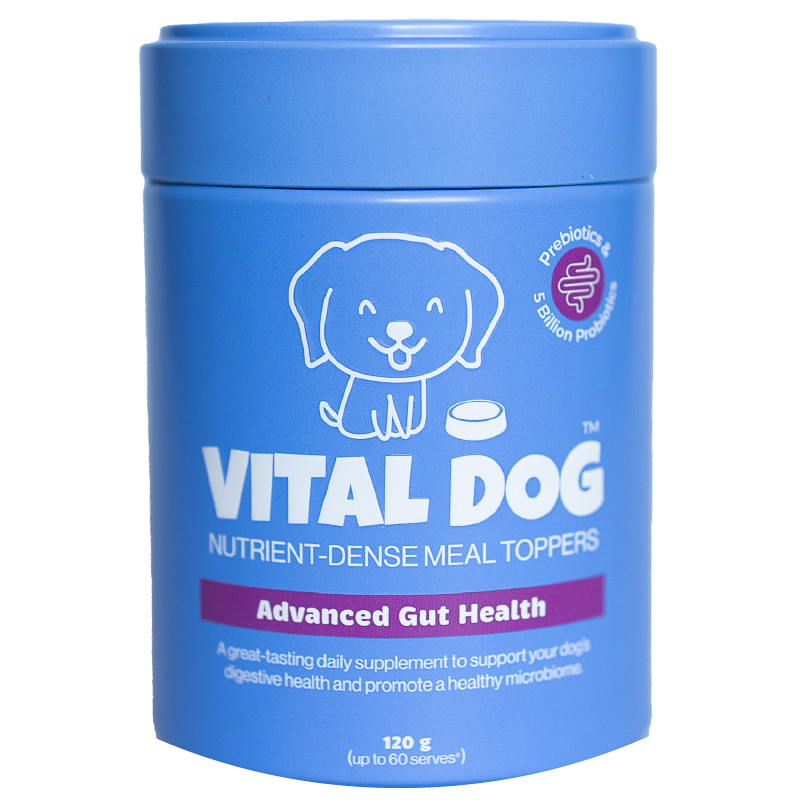As loving pet-parents, we all want the best for our dogs. After all, they’re not just pets, they’re family! We’re obviously fans of people boosting their dog’s health with nutritional supplements, however it’s important to be vigilant and ensure these additions are helpful, not harmful. Navigating the vast market of canine supplements can be tricky, especially when many products are engineered to be cheap and convenient for manufacturers, often with unnecessary ingredients that don’t do our dogs any favours when it comes to their wellness or longevity. This guide will help you understand some of the ingredients you might want to avoid in the future, and why opting for natural, whole-food-based supplements is the best choice for your dog's vitality and healthspan.

Fillers: More Volume, Less Value
Fillers are often used to add volume to supplements, cheapening the product while diluting its quality. While they might make the supplement look substantial, they are used primarily to cheapen formulation costs for manufacturers. Many offer little-to-no nutritional value and can sometimes even be harmful.
Some common fillers you may see:
- Grains: Wheat, oats, rice, corn and other cheap grains are used in some lower-quality chew treats and meal toppers. However despite being familiar, real foods, grains can be associated with an exacerbation in gut and skin issues for many dogs. Remember, protein and fats are essential for canine health and survival whereas there is no such requirement for carbohydrates, including grains.
- Animal ‘meal’: a broad term that can be a catch-all for meat scraps, bones, offal, and even beaks or feet. It should be noted that high-quality animal-specific ‘meals’ can be nutritious and beneficial for dogs, just be aware that non-specific terms like ‘meat meal’, ‘animal meal’ or ‘poultry meal’ can vary greatly in terms of composition, quality and suitability for canines.
- Soy: an easy way for brands to add bulk without excessive costs, soy is a common allergen for dogs which may trigger or exacerbate conditions of the gut, skin and ears. They may also contain phytates and lectins which impair nutrient absorption.
- Cellulose: a type of dietary fibre, is often used as a cheap filler but can cause gastrointestinal discomfort. It’s largely indigestible and not required for a dog who is consuming a nutrient-dense, whole food diet. There are other forms of dietary fibres that provide greater benefits for the microbiome and general health.
Binders: Hard on the Gut
Binders are ingredients that are often added to maintain the shape and integrity of a supplemental chew or tablet, but they may come with adverse effects such as disrupting your dog's gut health, creating dietary imbalances, and weight gain if consumed in excess, over time.
- Sugar alcohols: ingredients like glycerol and sorbitol can be used to help bind ingredients and manage moisture, but can lead to digestive upset, softer stools and smelly gas. Xylitol is a sugar alcohol that you should NEVER see on a label as it’s highly toxic to dogs and can lead to death.
- Flour: cheap flours made from grains like wheat, oats and chickpea play bulking and binding roles, yet as we noted above, can be a culprit in exacerbating gut and skin issues for many dogs.
- Nut butters: while generally an ingredient that dogs love, nut butters are a clever, cost-effective way for brands to provide a flavour boost and binding agent at the same time. Generally safe, be mindful of their very high caloric-density and also understand that for some dogs, peanuts (a legume that is classified as an allergen) can create or worsen conditions of the skin and gut.
Sweeteners: Feeding the Wrong Microbes
Sweeteners like sucrose, honey, and molasses may make supplements more palatable, but they can also feed harmful microbes in your dog’s digestive system and promote yeast overgrowth.
- Sucrose (table sugar): thankfully, it’s rarely used these days as it’s been clearly linked with over-eating, obesity and dental issues.
- Honey and molasses: these may seem like more natural choices, and can provide some health benefits, but the price of obtaining those benefits could be accompanied by blood sugar spikes and/or microbial imbalances of the gut and oral microbiota if consumed in large quantities or over prolonged periods of time.
Colours and Flavours: Often Synthetic, Always Unnecessary
Colours and flavours are often added to make supplements more attractive to both dogs and their owners. However, these additives are usually synthetic and offer no real nutritional value while potentially disrupting the gut microbiome.
- Synthetic colours: are derived from a myriad of sources, including petrochemicals, which are strongly associated with allergies and other health issues.
- Flavours: dogs are driven to eat foods that are nutrient dense and biologically-compatible, so the need to add flavours to mask the poor quality of the underlying ingredients of a supplement probably tells you all you need to know. Even if it’s a ‘natural flavour’.
Synthetic Vitamins: Less Effective and Potentially Harmful
Most people are unaware that many of the vitamins they see in the ingredient list of their daily multivitamin, or that of their pet supplements, are actually synthesised from chemical processes that originate from compounds extracted from coal tar and petrol. These compounds include acetone, benzene and formaldehyde.
While it’s true that some vitamins are derived from food compounds (e.g. vitamin C from glucose), when you see a list of B vitamins, vitamin A, D, K or E on supplement packaging, it’s almost impossible to know where they were sourced or how they were synthesised. Where possible, essential vitamins, minerals and amino acids should be provided to dogs via foods in their natural states, increasing the bioavailability of the nutrients while reducing possible risks of consumption.
GMO Ingredients: Uncertain Safety
Genetically modified organisms (GMOs) may be used in supplements without you knowing. Unless the product has a ‘GMO-Free’ claim, you could be rolling the dice.
While we acknowledge that GMO is a broad and complicated term, covering some practices that are safer and less deleterious than others, it’s our general belief that GMOs should be avoided for the benefits of our dogs as the long-term effects on health are still not fully understood.
Toxic Residues: Real Risks
Ingredients with a high risk of pesticide, insecticide, herbicide or fungicide residues can introduce harmful toxins into your dog’s diet. Residues can have numerous negative effects on health, including hormonal disruptions and increased cancer risk.
Wherever possible, whether incorporating plants into your dog’s diet in a whole food form, or supplying them with beneficial plant-derived compounds, look for brands and suppliers that use spray-free processes and can stand behind independent pesticide and other residue tests. Look for claims such as ‘pesticide-free’ or ‘herbicide-free’. Organic options are also great, however can be a bit pricier (they have to pay to be ’certified’) and don’t necessarily offer any additional benefit over those crops that are spray-free.
Opt for Whole Food-Based Supplements
When you’re looking to do the best for your dog’s wellness and longevity, consider opting for powdered supplements with ingredients derived from whole foods. These are generally more enjoyable for your dog and are absorbed more efficiently by their bodies. Unlike pills and chews, powders are less likely to contain fillers, binders, and other additives, too. You can take a look at all of the ingredients used in VITAL DOG meal toppers, here.
Conclusion
Providing the best nutrition for your dog is a commitment to their health and happiness. By avoiding supplements with synthetic additives, cheap fillers, sweeteners, palatants, or binders, and choosing those with real food ingredients, you can help your dog enjoy a long, vital life.





